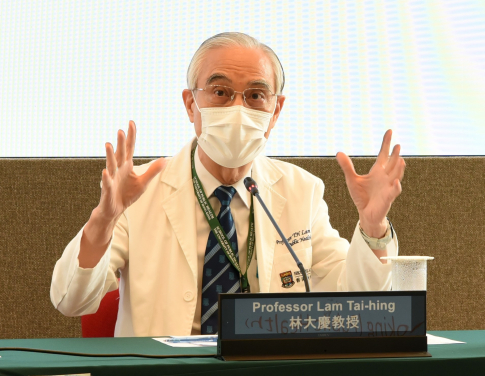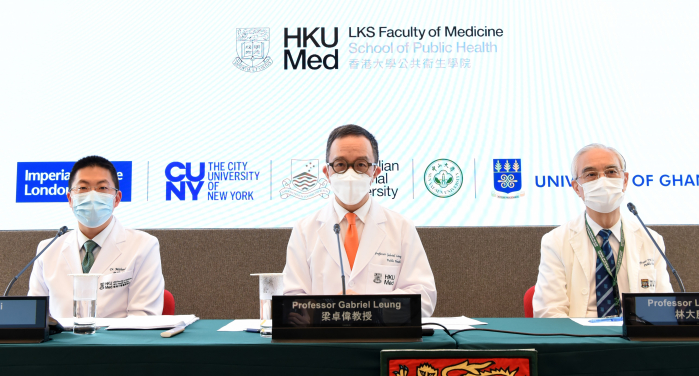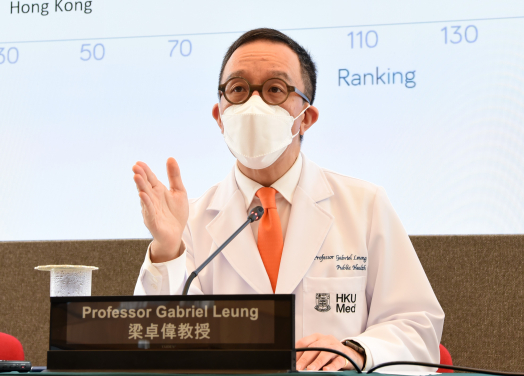Media
Tobacco control shown to be the key driver
for Hong Kong’s world-leading longevity
06 Sep 2021

‘Allowing heated tobacco products and e-cigarettes will lead to rapid re-normalisation of tobacco use, substantial increase in youth smoking of heated tobacco products and cigarettes and rising mortality and morbidity,’ said Professor Lam Tai-hing, Sir Robert Kotewall Professor in Public Health and Chair Professor of Community Medicine, School of Public Health, HKUMed. He also urges the Legislative Council to support the ban with no further delay.

HKUMed emphasises that tobacco control is shown to be the key driver for Hong Kong’s world-leading longevity. From left: Dr Michael Ni Yuxuan, Professor Gabriel Leung and Professor Lam Tai-hing.

‘Sustaining Hong Kong’s successful tobacco control might well save more lives in the next few decades,’ remarked Professor Gabriel Leung, Dean of Medicine, The University of Hong Kong; Helen and Francis Zimmern Professor in Population Health and Chair Professor of Public Health Medicine, HKUMed, who co-led the study.

‘Allowing heated tobacco products and e-cigarettes will lead to rapid re-normalisation of tobacco use, substantial increase in youth smoking of heated tobacco products and cigarettes and rising mortality and morbidity,’ said Professor Lam Tai-hing, Sir Robert Kotewall Professor in Public Health and Chair Professor of Community Medicine, School of Public Health, HKUMed. He also urges the Legislative Council to support the ban with no further delay.
- 1 / 3
- 2 / 3
- 3 / 3
For the seventh year and counting, Hong Kong has attained the world’s highest life expectancy. However, the reasons for Hong Kong’s longevity were until now poorly understood. Researchers led by LKS Faculty of Medicine, The University of Hong Kong (HKUMed) have recently unlocked the key reason for Hong Kong’s world-leading longevity to be effective and sustained tobacco control. The study is now in The Lancet Public Health, the world-leading public health research journal. [link to publication] (Updated in November)
Research methods and findings
Life expectancy is the single most fundamental measure of population health. Hong Kong’s highest life expectancy in the world has naturally motivated calls to understand and emulate its success. To identify the reasons for Hong Kong’s longevity, a research team led by HKUMed has conducted the largest and most comprehensive assessment to date by comparing 263 million deaths from Hong Kong, Singapore, South Korea and 18 countries of the Organisation for Economic Co-operation and Development (OECD) , including Australia, Austria, Belgium, Canada, Denmark, Finland, France, Germany, Italy, Japan, the Netherlands, Norway, Portugal, Spain, Sweden, Switzerland, the United Kingdom (UK) and the United States (US).
For the first time, it is shown that Hong Kong’s longevity is attributed to the lowest mortality of cardiovascular diseases in both men and women, as well as one of the lowest mortalities of cancer among women. Such an achievement is underpinned by Hong Kong’s attainment of one of the world’s lowest smoking prevalences, and in fact the lowest smoking-attributable mortality in the high-income regions surveyed. The HKUMed study also showed that low smoking prevalence is the single most important reason for Hong Kong’s longevity, accounting for 50.5% and 34.8% of its survival advantage over the affluent economies for men and women respectively.
‘Hong Kong’s unique combination of economic development and low smoking prevalence has led to the decline of diseases of poverty1 while suppressing the diseases of affluence2,’ said Dr Michael Ni Yuxuan, Clinical Associate Professor, Division of Community Medicine and Public Health Practice, School of Public Health, HKUMed, who co-led the research. ‘This framework could serve as an exemplar and roadmap for rapidly developing and high-income economies around the world.’
Significance and implications
Smoking is the single largest cause of preventable death. Yet tobacco use remains very high among men in Mainland China (42%) and South Korea (36%), and among both sexes in France (28%), Spain (24%), the UK (16%) and the US (16%). The emergence of e-cigarettes and heated tobacco products (HTPs) in Hong Kong, particularly among youths, is very alarming.
‘Allowing HTPs and e-cigarettes will lead to rapid re-normalisation of tobacco use, substantial increase in youth smoking of HTPs and cigarettes and rising mortality and morbidity,’ said Professor Lam Tai-hing, Sir Robert Kotewall Professor in Public Health and Chair Professor of Community Medicine, School of Public Health, HKUMed. ‘Parents, education, healthcare and social welfare sectors and the great majority of the population have provided the strongest support for a total ban of HTPs. We urge the Legislative Council to support the ban with no further delay.’
Hong Kong is a pioneer in tobacco control and was one of the first jurisdictions in the world to impose a total ban on smoking in all indoor workplaces and many public places. These latest study results call for a renewed focus on tobacco control, which needs to be at the forefront of the forthcoming public health agenda.
‘Successful tobacco control has allowed Hong Kong’s life expectancy to exceed populations around the world. This is an important finding to potentially save the largest number of lives in Hong Kong and worldwide, precisely because the policy solutions are well rehearsed and directly attributable to longevity,’ said Professor Gabriel Leung, Dean of Medicine, The University of Hong Kong; Helen and Francis Zimmern Professor in Population Health and Chair Professor of Public Health Medicine, HKUMed, who co-led the study. ‘Sustaining Hong Kong’s successful tobacco control might well save more lives than Hong Kong has and would lose to COVID-19 by several orders of magnitude and for the decades to come.’
About the research team
The research team was led by Dr Michael Ni Yuxuan, Clinical Associate Professor, Division of Community Medicine and Public Health Practice, School of Public Health, and Professor Gabriel Leung, Dean of Medicine, HKU; Helen and Francis Zimmern Professor in Population Health and Chair Professor of Public Health Medicine, HKUMed. Other team members include Dr Vladimir Canudas-Romo, Associate Professor of Australian National University; Professor Alan Lopez, The University of Melbourne, Australia; Professor Majid Ezzati, Imperial College London, the United Kingdom; Dr Yao Xiaoxin, Associate Professor, The Eighth Affiliated Hospital of Sun Yat-sen University, Shenzhen; Ms Shi Jian, PhD candidate; Mr Francis Flores, Technical Officer; Dr Daniel Ho Sai-yin, Associate Professor, Division of Community Medicine and Public Health Practice; Prof Lam Tai-hing, Sir Robert Kotewall Professor in Public Health and Chair Professor in Community Medicine; Dr Catherine Mary Schooling, Associate Professor and Cluster Leader (Non-communicable Diseases in Global Health), Division of Epidemiology and Biostatistics, School of Public Health, and Mr Mathew Chow, MBBS V student, HKUMed.
Acknowledgements
This study was conducted in collaboration with The Australian National University, The City University of New York, Imperial College London, Sun Yat-sen University and the University of Ghana, and funded by the Early Career Scheme (No. 27602415) of the Research Grants Council of Hong Kong.
About the School of Public Health, HKUMed
The School of Public Health, LKS Faculty of Medicine of The University of Hong Kong has a long and distinguished history in public health education and high impact research. With world leading research in infectious diseases as well as on non-communicable diseases of both local and global importance, the School has made significant contributions through its research and advocacy to improve the health of populations and individuals, both locally and globally. The School is a leading research and teaching hub in public health on influenza and other emerging viruses, control of non-communicable and infectious diseases, tobacco control, air pollution, psycho-oncology, behavioural sciences, exercise science, life-course epidemiology, population mental health, and health economics, health services planning and management. This work has informed international (e.g. the US Food and Drug Administration, Health Canada, the World Health Organization), national and local public health policies.
Media Enquiries
Please contact LKS Faculty of Medicine of The University of Hong Kong by email (medmedia@hku.hk).
1Examples of diseases of poverty include infectious diseases and infant mortality.
2Examples of diseases of affluence include non-communicable diseases, such as cardiovascular diseases and cancer.
